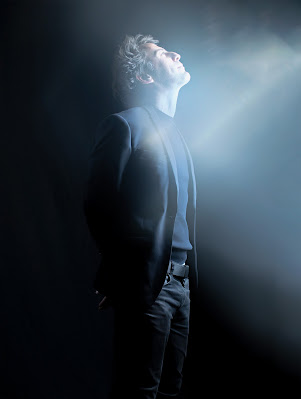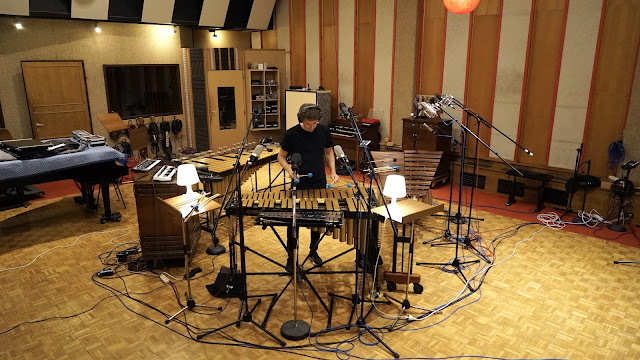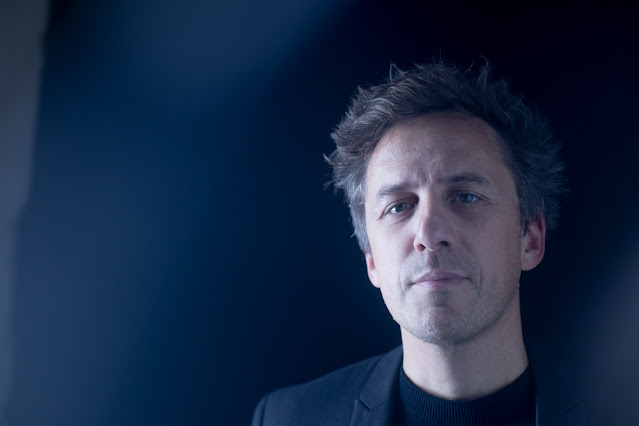 |
| Pascal Schumacher & Echo Collective recording LUNA (Photo Frederick Migom - Jet Studios Brussels) |
The Luxembourg-born vibraphonist and composer Pascal Schumacher released his first solo album, SOL, in 2020 and he is about to release a new album, LUNA, with the Brussels-based Echo Collective on the Neue Meister label. Pascal's career has crossed classical music, jazz and improvisation, whilst he recently said that he considers these classifications obsolete. I recently met up with Pascal via Zoom to chat about LUNA, composing and more.
 |
| Pascal Schumacher (Photo Fredrik Altinell) |
For those that have heard SOL, LUNA probably feels like a very logical next step. SOL is a solo album, with fewer tracks with different instrumentation and the vibraphone is the main character, but you can listen to LUNA and discover that it is complementary to SOL.
As Pascal has a history of improvisation in performance, I was intrigued as to whether the works on the new album were based on pre-composed music or improvisation, and the answer is both! With tracks like 'Infinity', 'Molodost' and 'Charles Duke', the string parts were 95% composed. This was what Pascal had initially planned, but he got on so well with the members of the Echo Collective and heard them improvising during the lunch break, that plans changed. The track 'Luna' had been intended to be solo vibraphone and synthesizer, improvised, but he decided to add a full carpet of improvised strings, taking advantage of the fact that the Echo Collective understood his music and his sound. For the track, 'Luna', there was no score, he just gave them notes on the emotion and dramaturgy, and they laid it down in just two takes.Another track was also improvised but was created almost by accident. It was something he improvised on marimba when he was alone in the studio, a bit of fun, but the microphone was left on. It wasn't supposed to be on the album, but when they played it back Pascal decided to include it. He comments that so much music you record, it is lost, or it stays on your hard drive, but this little sketch will stay with him for a while thanks to the album.
 |
| Pascal Schumacher recording LUNA (Photo Frederick Migom - Jet Studios Brussels) |
Pascal trained initially as a classical percussionist, then moved into jazz, playing in jazz bands and for ten years or so had success in this way. But in 2018 he was performing at the Jazz & The City festival in Salzburg where he was a regular visitor. The organiser, Tina Heine asked him to do a solo concert, which would be his first. He agreed to perform a thirty-minute set, to avoid the pressure of giving a full concert. But it proved to be a nice moment and he performed more than 30 minutes of music. He decided that this was the moment to go on his own.
SOL was a direct consequence of this, but with LUNA he felt he wanted people around him. Choosing the Echo Collective was deliberate, he wanted to work with strings. Whilst he had written for string orchestra and for string quartet, he had never had strings on one of his main projects, and he wanted to collaborate with the string ensemble, so the Echo Collective is on four of the nine tracks. When we spoke, Pascal was about to start touring LUNA, for some concerts he will be performing alone and for others with a string ensemble. For those where he is alone, he will not be able to play everything on the album. Then in the Autumn he was be performing again with the Echo Collective and plans to see how these go and what might come next.
He admits that he dislikes classifications in music but the modern classical composers (sometimes called new classical or neo-classical) interest him, such as Max Richter and Nils Frahm. And Pascal records for the Neue Meister label which specialises in these modern classical composers. But whilst there are plenty of interesting things happening in this field, he comments that not everything is nice! He likes the diversity possible nowadays, the opening of boundaries between genres. And for Pascal, mixing things up feels contemporary, in fact more contemporary that much contemporary classical music and he played a lot of that when he was a student. He likes the term modern classical, finding it cool, whereas neo-classical comes with echoes of Stravinsky, and some people use the term indie classical.
He has always played percussion, starting on a drum set and then going on to study classical percussion, where he focused on melodic instruments. Whilst SOL used just vibraphone and synthesizer, with LUNA he has returned to his roots and to vibraphone and marimba has added gongs, crotales, and other percussion. He now feels that it is nice to have the various different threads to his background, jazz, contemporary classical, minimalism. Composing, however, came to him later. When he moved into jazz, it was very common for people to write their own pieces, which gave him something of a push in this direction. But having played in a lot of orchestras as well, he feels he had a somewhat later view. A lot of contemporary classical music attracted him, and he studied musicology as well, thus bringing variety to the compositional mix. He enjoys the way his composition now touches lots of different worlds without him having a complex about it, and he feels at ease.
 |
| Pascal Schumacher (Photo Fredrik Altinell) |
When I ask about his musical heroes, he says he has many but comes up with an intriguingly varied trio. First, he mentions Henry Purcell, whose viola da gamba fantasias he enjoys, and sound-wise these come close to what he was trying to do in LUNA with the string writing. And the morning we talked, he had been listening to Charlie Mingus, his Self Portrait in Three Colours, music that Pascal finds simple, challenging and intriguing. Then there was Serge Gainsbourg, not only his jazz but for his chansons which put a smile on your face.
LUNA is released on Neue Meister on 25 March, and Pascal is touring the album from 23 March, full details from Pascal Schumacher's website.
Never miss out on future posts by following us
The blog is free, but I'd be delighted if you were to show your appreciation by buying me a coffee.
Elsewhere on this blog
- Two strongly contrasting yet major figures from 20th century Hungary, György Ligeti and Zoltán Kodály - record review
- Surprising style, elegance and imagination: Auber Overtures volume five - record review
- Guilty pleasures: Sondra Radvanovsky in the closing scenes of Donizetti's three major Tudor operas - record review
- Having recently recorded Lasse Thoresen's virtuosic cello concerto, I chat to Norwegian cellist Amalie Stalheim about new music, and the continuing importance of the Romantic repertoire - interview
- A room of mirrors: Emiliano Gonzalez Toro, Zachary Wilder and Ensemble I Gemelli - record review
- Bleckell Murry Neet: Traditional tunes from Cumbria in engaging modern versions for guitar and harp - record review
- Black Renaissance Woman: Samantha Ege and John Paul Ekins explore music by six remarkable women from the Chicago Renaissance - record review
- Fun, seduction & politics: Rimsky Korsakov's The Golden Cockerel from English Touring Opera - opera review
- A new opera, an unperformed 19th century opera, plus Weber & Bellini: I chat to Richard Tegid Jones of Rugby-based Random Opera Company - interview
- A joyful celebration of playing together: MiSST's 9th Annual Concert - article
- Urban dystopia: Guildhall School's double bill of Judith Weir's Miss Fortune and Menotti's The Telephone - opera review
- Elan and style: Grands Motets by Michel-Richard De Lalande from Sébastien Daucé and Ensemble Correspondances - record review
- Home

.jpg)









No comments:
Post a Comment